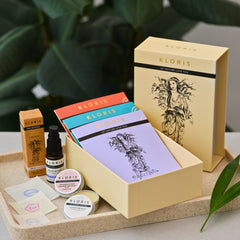Table of Contents
Table of Content
The CBD industry has given new meaning to the term ‘Greenwashing’. Ordinarily this is a process whereby brands tout themselves as natural and eco-friendly, when in actual fact they’re very much not.
We used to mainly see this heinous mislabelling in cosmetics, tricking well-meaning consumers into purchasing products which contain the harmful ingredients they are trying to avoid. Now we’re seeing this problem across many claimed CBD products – plenty of which contain no CBD at all. There are also brands selling ‘hemp’ products without mentioning that they contain CBD. Weird, right? But there’s a reason for this. Just not one we agree with.
Here at KLORIS, we’re passionate about brand transparency. We know that it’s up to us to deliver products that are the real deal, but we also believe that it’s up to us to help people understand what they are buying – from us and from elsewhere.

Many other companies appear to have no qualms about duping the consumer. Sometimes simply to amp up their social media marketing strategy (did you know CBD products can’t be promoted in ads on social media? But hemp can) and sometimes to tap into the well deserved hype of high quality CBD, without actually putting any of those beneficial cannabinoids into a product.
We suppose it could be argued that it’s up to the consumer to do their research – to know what they want and what they don’t. To fully understand what’s put on the ingredients label. But there are lots of ingredients labels that are deliberately misleading, even omitting the mention of some of the harshest chemicals.
For example, a 2017 study into 17 high-street perfumes revealed an average of 29 chemical ingredients on the label. However, upon analysing, test results showed an average of 14 extra undisclosed chemicals covered by the innocuous word ‘perfume’ or ‘parfum’. And anyway, not everyone has the time or means to do the lengthy research required to become familiar with ingredients to avoid, or even which CBD products are legit and which aren’t. We, the companies you buy from, do.
Others may argue it’s up to you to know what you’re buying, but we’d argue that it’s up to us (and them) to help you make informed decisions. Better yet, to supply you with trustworthy products that are clean and high quality, and labelling which tells the truth at a glance. And we know we’re not alone.
One ‘big business’ survey showed that 39% of shoppers said that they would switch brands in pursuit of brand transparency and 56% said that additional product information, like cannabinoid lab reports, inspires more trust in a brand.
A further study conducted by the Sustainability Research Institute, School of Earth and Environment, University of Leeds revealed that a third of consumers are also rightly concerned about the origin of things they buy – an aspect which is of paramount importance in the CBD industry to ensure you’re getting a product that is a help, not a hindrance.
So, to help you, we’ve put together a little list of what to look out for in the CBD industry and how to choose a CBD (or hemp) product that’s right for your needs.
HEMP SEED VS CBD
One of the big ones to watch out for is buying a CBD product which contains no cannabinoids. If you’re after a product to help you regain balance, focus and a calm state of mind then need CBD to be present in reasonable amounts - for example in CBD oil drops you ideally want a strength of 5% or above.
Sadly, there are lots of products that say ‘CBD’ or ‘Cannabis’ on the label which use hemp/cannabis sativa seed extract rather than the flower, leaves or bud of the plant. Hemp seed has many wonderful benefits to offer, but no cannabinoids whatsoever. Always check.
LOOK FOR PROVENANCE
If a company doesn’t clearly state where and how their cannabis or hemp is grown, don’t buy it. These plants have the amazing capacity to draw in everything from the ground they’re grown in, including pesticides and toxic waste. Because of this, huge crops of hemp are often planted to clean up spills and ‘dirty’ land – and these are now sometimes sold to be used for mass manufactured CBD oil.
Lots of business people have cottoned on that there’s money to be made from selling CBD in vast quantities, more so if you buy up the material cheap and churn it out. This is horribly unethical and potentially extremely dangerous.
When buying CBD and (hemp seed products too) always choose products which are clearly stated as being organically made to avoid harming your health. It may be more expensive, but you’re throwing your money away with anything else.
CHECK THE EXTRACTION PROCESS
You’ll see on all KLORIS products that we extract cannabidiol and a broad spectrum of other cannabinoids, terpenes, flavonoids, and nutrients, essential for the 'entourage effect' using gold-standard supercritical CO2 extraction, a process that is precise, environmentally friendly and free from solvents.
If a CBD product does not refer to CO2 extraction, be wary. Other methods, if not managed very carefully, can leave behind residual solvents that you don’t want to be ingesting.
At KLORIS we’re just about as open as it gets because we have nothing to hide. You’ll find all the information you need (including purity and potency certificates for each batch awarded by a CTA approved lab), but if you have any other questions get in touch. We’re always more than happy to talk things over.





